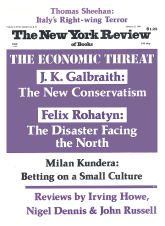Dorothy Day died on November 29 and this death will make a difference to many people, not all of them her co-religionists. She has spoken of her life in two autobiographical volumes, From Union Square to Rome (1938) and The Long Loneliness (1952). As a girl and as a young woman she was changed in mind and sensibility by her reading of Kropotkin, Dostoevsky, Gorky, and Tolstoy. She early felt committed to the poor and to all victims of injustice; in this respect, though not in others, she reminds us of Simone Weil. For many years she inhabited the left-wing bohemia of the United States. In 1927 she was baptized a Catholic and after some false starts she founded the Catholic Worker movement.
She herself always said Peter Maurin was the real founder. He was a Frenchman, an old supporter of Le Sillon, who combined an untroubled adherence to Catholic dogma with a radical critique of modern bourgeois society. (This combination of social radicalism with dogmatic orthodoxy, of life among the rejected of society, the lumpen proletariat of Marx’s social analysis, with a faithful adherence to the traditional prayer and sacramental life of the Church, has been the distinguishing mark of the movement. It is this which certainly puzzles and may sometimes irritate the latest generation of liberal Catholics in North America, who are more radical in their theological thinking but less radical in their social thinking and practice.) No doubt Maurin was the principal source of ideas; but without the drive and energy and the purity of motive, without what some would dare to call the sanctity, of Dorothy Day, it seems unlikely the Catholic Worker would have first been sold on the streets of New York on May Day 1933.
The effects of the movement she founded are hard to measure. If one looks at the larger and plainer features of political and religious life in the United States and in other English-speaking countries the effects seem slight, though it is astonishing how many priests and members of religious orders had their lives turned right round by their encounter with Dorothy. She herself, who had as little vanity as is conceivable in a human being, never went in for counting heads and was always eager to acknowledge her intellectual debts; to Maurin, Mounier, Maritain, Gandhi, Berdyaev, and others. What distinguished her passion for justice and peace was her determination to live out her moral and political attitudes. She shared the life of the poor; she fought hard for the victims of injustice; and she came to know the insides of prisons in her work for civil rights and against preparations for nuclear war.
Two things seem to me to bring out the peculiar flavor of her life and work. First, she never failed in charity toward those who were farthest from her. She was always respectful and affectionate toward Cardinal Spellman and there is some reason to think he was touched by this. She loved Cardinal McIntyre of Los Angeles even though she disagreed with most of his distinctive positions. Many liberal Catholics were unable to speak without rage of these two prelates. Secondly, her way of writing is a perpetual example and rebuke to most popular writing on religion. Her direct, limpid prose didn’t come from any pre-occupation with style. It came from a marriage of intense thought with the English language as it has been used by the best authors. In a time when the thought and language of religious writers have been corrupted by the rhetoric of neo-Marxism and neo-Freudianism and by the jargon of much writing in sociology, Dorothy Day kept certain minimum standards of decency in front of us. Nothing in her writing remind us of that wilderness in which “meaningful,” “viable,” “parameters,” “relating to,” and the rest grow out of the stony soil. Her prose matches her spiritual purity. The style, the integrity, the magnanimity, the beauty of Dorothy Day’s work and character will be remembered when many of those who made a greater noise in their day are quite forgotten.
This Issue
January 22, 1981



